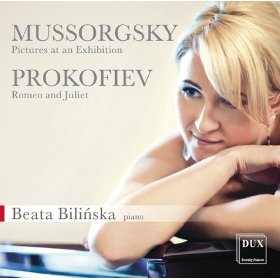MUSSORGSKY Pictures at an Exhibition (piano)
Mussorgsky’s Pictures from Pole Bilińska and Kiwi De Pledge
View record and artist detailsRecord and Artist Details
Composer or Director: Sergey Prokofiev, Modest Mussorgsky
Genre:
Instrumental
Label: Dux Recordings
Magazine Review Date: 12/2012
Media Format: CD or Download
Media Runtime: 65
Mastering:
DDD
Catalogue Number: DUX0858

Tracks:
| Composition | Artist Credit |
|---|---|
| Pictures at an Exhibition |
Modest Mussorgsky, Composer
Beata Bilinska Modest Mussorgsky, Composer |
| (10) Pieces from Romeo and Juliet |
Sergey Prokofiev, Composer
Beata Bilinska Sergey Prokofiev, Composer |
Composer or Director: Ludwig van Beethoven, Johannes Brahms, Modest Mussorgsky
Genre:
Instrumental
Label: Champs Hill
Magazine Review Date: 12/2012
Media Format: CD or Download
Media Runtime: 69
Mastering:
DDD
Catalogue Number: CHRCD030

Tracks:
| Composition | Artist Credit |
|---|---|
| Pictures at an Exhibition |
Modest Mussorgsky, Composer
Modest Mussorgsky, Composer Stephen De Pledge, Piano |
| Sonata for Piano No. 8, 'Pathétique' |
Ludwig van Beethoven, Composer
Ludwig van Beethoven, Composer Stephen De Pledge, Piano |
| (2) Rhapsodies |
Johannes Brahms, Composer
Johannes Brahms, Composer Stephen De Pledge, Piano |
Author: Jed Distler
Bilin´ska zips through the ‘Unhatched Chicks’ ballet in the wink of an eye, yet treads cautiously through the ‘Limoges’ marketplace’s hustle and bustle, and underplays the majesty and gravitas of ‘The Great Gate at Kiev’. By contrast, her spot-on tempi and instinct for implying orchestral colour make a cogent case for Prokofiev’s piano versions of 10 highlights from the ballet Romeo and Juliet. Note her hefty swagger in ‘Montagues and Capulets’ or the easily unfolding lyrical peaks and valleys of the final movement depicting Romeo bidding Juliet farewell, to mention just a few attractive examples.
Perhaps a wider sonic dynamic spectrum creates a more forceful impression throughout Stephen De Pledge’s Pictures, along with his starker, less nuanced way with Mussorgsky’s more declamatory writing in the Promenades and the final two movements. He shares Bilin´ska’s heavy-handed view of ‘Limoges’, yet his slower, more rhythmically centred ‘Chicks’ and ‘Tuileries’ yield more characterful results. On the other hand, he falls into a trap that snares many pianists in ‘The Old Castle’: his textures thicken and his tempo gets gradually slower as the music progresses.
De Pledge’s rapid repeated notes in ‘Samuel Goldenberg and Schmuyle’ are not so consistently executed as Bilin´ska’s, although neither pianist matches the insistent drive and character of Richter’s sonically dodgy yet interpretatively incomparable 1958 Sofia version. He reveals an unruffled, pretty surface in Beethoven’s Pathétique Sonata, repeating the first-movement introduction à la Rudolf Serkin, yet misses the music’s linear tension and incisive grit. Similarly, De Pledge easily grasps and conveys the large-scale keyboard dimensions of Brahms’s Op 79 Rhapsodies but without Emanuel Ax’s steadier sweep and clearer articulation of bass-lines, let alone Wilhelm Kempff’s remarkable sense of polyphony.
Discover the world's largest classical music catalogue with Presto Music.

Gramophone Digital Club
- Digital Edition
- Digital Archive
- Reviews Database
- Full website access
From £8.75 / month
Subscribe
Gramophone Full Club
- Print Edition
- Digital Edition
- Digital Archive
- Reviews Database
- Full website access
From £11.00 / month
Subscribe
If you are a library, university or other organisation that would be interested in an institutional subscription to Gramophone please click here for further information.




